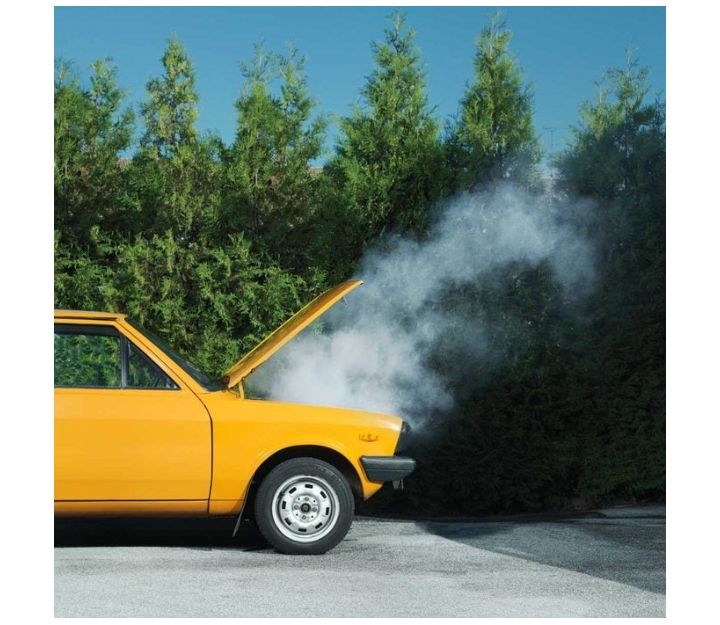Repair instructions
What Causes a Car to Overheat When Idling?
Summary
When your car overheats while idling, it could be due to several factors, such as prolonged traffic, a failing cooling system, or a damaged radiator fan. A malfunctioning thermostat may also be to blame. To spot overheating, keep an eye on the temperature gauge and check if your car’s hood feels unusually hot.
If your car overheats at idle, something’s likely wrong with the engine or cooling system. Here’s a list of common culprits:
- Prolonged idling or heavy traffic
- Damaged or malfunctioning cooling system
- Low coolant levels
- Coolant leaks
- Broken radiator fan
- Faulty thermostat

Why Does My Car Overheat When Idling?
Several factors can cause your car to overheat when it’s idling, but not while driving. Identifying the root cause may take some investigation, but these are the six most common reasons:
1. Prolonged Idling or Stuck in Traffic
Sitting in traffic for too long—especially on hot days—can cause your engine to overheat. When your car is barely moving or stopped for extended periods, the engine is unable to cool down effectively. Additionally, leaving the AC on can exacerbate the issue, as it forces the engine to work harder.
If you notice the engine temperature rising, try turning off the AC to see if it helps. If the temperature continues to climb, there could be a deeper issue.
2. Malfunctioning Cooling System
Your car’s cooling system is crucial for maintaining a safe engine temperature. If the radiator cap is faulty, the radiator is clogged, or the cooling fan isn’t working properly, your engine may overheat while idling. A failing fan or fan clutch may prevent enough air from reaching the radiator, causing a buildup of heat.
Excess pressure in the cooling system can raise the engine’s temperature and may damage components like the radiator, hoses, and even the engine block. Don’t ignore this; a cooling system malfunction can quickly escalate into costly repairs.
3. Low Coolant Levels
Low coolant levels can prevent your engine from regulating its temperature properly. Always check and refill your coolant according to your vehicle’s maintenance schedule. If your coolant reservoir is low or empty, your engine is more likely to overheat. Never drive with an empty coolant tank.
4. Coolant Leaks
Leaks in the cooling system can lead to overheating. These leaks are commonly caused by damaged hoses, faulty radiator caps, or blown head gaskets. Regularly inspect your car for signs of coolant leaks, especially around the radiator, hoses, and water pump. Ignoring a coolant leak can damage your engine and lead to expensive repairs.
5. Faulty Radiator Fan
A broken radiator fan is another common cause of overheating at idle. The fan is essential for drawing air through the radiator to cool the engine. If the fan motor is malfunctioning, or if there are damaged wires or blown fuses, the engine may overheat. Make sure to have the fan checked if your car tends to overheat in slow-moving or stationary traffic.
6. Broken Thermostat
If your car’s thermostat is malfunctioning, it may not regulate the coolant flow correctly. A stuck thermostat could prevent the coolant from circulating, causing the engine to overheat at idle. If you suspect a thermostat issue, have it tested and replaced if necessary.
How Can You Tell If Your Car Is Overheating?
The two most noticeable signs of an overheating engine are:
- Temperature Gauge: A high or rapidly rising temperature reading on your dashboard.
- Hot Hood: If the hood of your vehicle feels too hot to the touch, that’s a good sign that the engine is running too hot.
Other indicators of overheating include steam or smoke rising from the engine, which could signal that the coolant has reached its boiling point and turned to vapor.
What Can You Do to Prevent Overheating?
There are several preventative steps you can take to keep your engine cool:
- Install tinted windows to reduce heat buildup.
- Use sunshades or window covers when parked.
- Regularly check and top up your coolant levels.
- Schedule periodic radiator flushes to remove dirt and debris.
- Refill or replace engine coolant as recommended.
- Limit AC use on extremely hot days to reduce strain on the engine.
Frequently Asked Questions
Q: Why does my car overheat when idling with the AC on?
If your car overheats when idling with the AC on, it may be due to a malfunctioning engine cooling fan, a faulty water pump, or blocked fins on the AC condenser or radiator. These issues can make it harder for your engine to release heat, resulting in an overheating condition. Have your cooling system and related components inspected.
Q: Can I still drive my car if it’s overheating while idling?
No, driving an overheated vehicle is never a good idea. Overheating puts significant strain on the engine and can lead to severe damage. If your car is overheating, pull over as soon as it’s safe to do so and turn off the engine to let it cool. Allow the engine to cool down for at least 30-40 minutes before continuing to drive or consider having the car towed to a repair shop.
